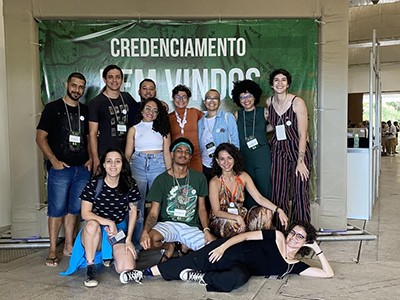As a full professor working in public health in the University of California system, I’m often asked about my funding portfolio. Many junior faculty members assume I’m the principal investigator (PI) of multiple million-dollar grants, with a large laboratory and a prolific paper output, because this is the norm for professors at my institute.
When my colleagues hear that I have a small farm, run various programmes on and off campus and make time for real life, they often ask me how I do it all. They find that grant-writing and grant-related administrative duties monopolize their time, often including nights, weekends and holidays. In fact, I don’t spend too much time applying for grants, and I’ve never received the kind of massive, five-year golden grant that many scientists spend years seeking.
Twelve scientist-endorsed tips to get over writer’s block
Instead, I’ve managed to build a career by collecting scientific and professional recognition in other ways, such as performing services on my campus that were deemed important to academic leaders; working closely with community partners on HIV prevention and care; identifying and studying significant gaps in public-health research as a whole; and mentoring and funding many stellar students. I’ve had great colleagues and collaborators, who have helped me to create impactful, well-funded research projects. By seeking fulfilment from elsewhere in my career, I avoid getting stuck on a grant-writing treadmill.
The grant grind
This attitude goes against what’s generally associated with academia. There’s lots of pressure, particularly at research-intensive universities in the United States, for academics to vacuum up government grants. Research-project grants from the US National Institutes of Health (NIH) are among the most prestigious. My colleagues often submit their proposals for multiple years of funding through these large grant mechanisms quarterly or semi-annually, in the hope that their proposals will make their way through the peer-review process and eventually be funded.
The kinds of large project that receive this funding take many years. They require researchers to generate ideas, meet with academic and community colleagues and programme officers, finalize the proposal, secure funding, launch the project and publish the results — often applying for further grants in between to continue the work. And that’s without taking into account actually doing the research that the grant should pay for.
I was denied tenure — how do I cope?
Of course, I have applied for grants in my 13 years as a faculty member, with some successes and multiple failures (which is the norm). In that time, I have received funding as a PI from both non-profit and for-profit organizations, including the Washington DC-based charity the Patient Centered Outcomes Research Institute and Merck Pharmaceuticals in Rahway, New Jersey. I have also been funded as a co-investigator by non-profit organizations, federal agencies, state agencies and my university. But I’ve also found ways to do impactful research at a low cost.
Avoiding the treadmill
I’d encourage any academic weighing up their grant-writing responsibilities to remember that doing research with publicly available data is fairly cheap; so is research with data from existing studies led by your colleagues. Data analysis, interpretation and even thought pieces (such as this one) can change science as we know it and move the needle in terms of innovation and impact.
For instance, I’ve written papers on how researchers can decide what to pay people who participate in research. My first paper on the topic was a commentary that pointed out how this decision-making seems to be based on personal beliefs and institutional norms1. I proposed a payment database where investigators could record the types and amounts of payment they offered to research participants. This paper did not include any data and didn’t require deep coffers of funding to complete, but pointed out the importance of an under-studied area, and demonstrated that having data from multiple studies would be a starting point for determining fair practice. It led to research collaborations with leaders in ethics, and to investigator-initiated funding from Merck Pharmaceuticals.

An orchard at Brown’s hobby farm.Credit: Brandon Brown
Another paper I wrote on the same phenomenon at my own institution was completed without funding2. I co-wrote this with students and community members who gained the benefit of a publication.
Given that I do not routinely receive millions of dollars in grants at my research-intensive university, it helps to receive some independent awards and honours and to publish opinion pieces in prestigious venues. Academia is reputational: you have value if, and only if, others see that value.
I’ve had some recognition from various award bodies, which has helped me to gain a small pot of funding for the lab when I need it. For example, the US National Academy of Medicine gave me an award as an emerging leader in health and medicine for my work on HIV and ageing. The Japan Association for Bioethics recognized my work on participant payment.
This seems to carry as much value as does independent funding when it comes to merit review, promotion and establishing national reputation. This makes sense, because not every grant application is successful, but an independent award is recognition of one’s success.
Being a recognized thought leader on a certain topic also attracts collaborators interested in that topic, and can lead to invitations to give presentations in your own country or abroad; to produce publications; and to join a research team as a key scientist or consultant on future grants. It can also lead to future honours.
I’d advise other researchers hoping to pursue a similar path to build your reputation and get your work recognized by joining professional societies that bring together scientists in your field for conferences and to work on specific reports. For me, those organizations are the American Public Health Association and the International AIDS Society.
Building collaboration
But what if you are still finding your path and don’t have recognition and prestige yet? How do you progress in academia without securing grants?
Being part of large research teams has given me opportunities to bring my expertise to certain parts of a project, without the burden of leading the whole thing. There is not enough time for one person to be the PI of every research endeavour they have an interest in, and focusing on leading one or just a few at a time leaves time for life outside the academy and for self-care. But being on a research team can also lead to future grant opportunities. And it creates chances to publish without having to lead the work. Such output serves as an indicator of research productivity.
How I run a virtual lab group that’s collaborative, inclusive and productive
For example, I was part of the Mental Health and Wellness Study Group led by Morenike Folayan, a public-health researcher at Obafemi Awolowo University in Ile-Ife, Nigeria. This group addressed emerging mental-health concerns during the COVID-19 pandemic, with data collected from participants in 152 countries, resulting in several papers.
I have also worked for around seven years with Karine Dubé, a sociobehavioural scientist at the University of California, San Diego. We collaborate on the Last Gift Study, in which people who are terminally ill and living with HIV consent to donate their tissue after death for research towards an HIV cure. I bring expertise in research ethics and data analysis to these team projects, so I can make strong contributions and share in the team’s success.
Finding purpose
Finding purpose in the academic space is important. At times I find myself putting efforts into a topic that I am passionate about, but that some people deem unimportant or irrelevant. An example is leading mentorship programmes for scientists from minority groups when my administrators might think my time would be better spent applying for research grants. I’ve been lucky in being able to fund my students in broad areas of science through the California Alliance for Minority Participation programme in Riverside, which aims to diversify the scientific workforce by increasing the number of people from under-represented groups who get baccalaureate and graduate degrees in science, technology, engineering and mathematics fields. I also use my leadership skills to help local community organizations that have not yet succeeded in gaining substantial funds to reach their potential and make significant impact. And I write on a topic that seems to be one of the last unexplored frontiers in research: paying participants.
Academics who disparage these efforts eventually see their blind spots and the need to change paradigms. This has been helpful in securing me awards, important collaborations and even funding. Every journey in academic research is different. Grants are one way to highlight research expertise — but not the only way.




